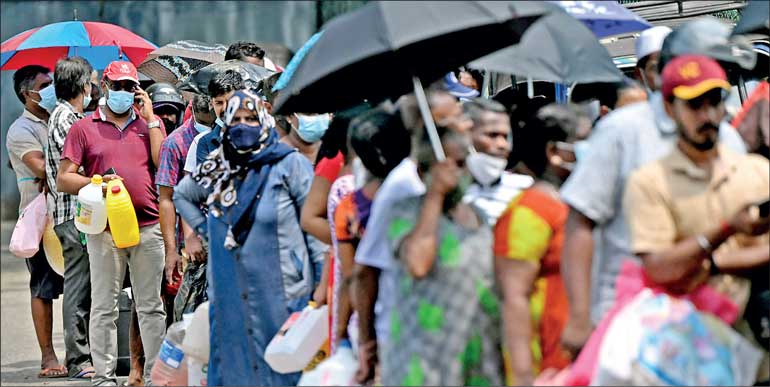Thursday Feb 19, 2026
Thursday Feb 19, 2026
Friday, 21 February 2025 00:26 - - {{hitsCtrl.values.hits}}

Disappointingly, the 2025 Budget fails to make social protection for the most precarious families a budgetary priority

 In his spirited Budget speech, President Anura Kumara Dissanayake described the priority for the first Budget of the NPP Government as thus: “Mass struggles and last year’s election saw people asserting their political rights. What is necessary is for economic rights to be similarly asserted. This is the philosophy of this Budget.” As the President rightly pointed out, a national Budget is not merely a technocratic exercise of allocating State funds to various ministries for the year, but it also reveals the fundamental ideological thrust of a government – a compass, guiding its economic vision.
In his spirited Budget speech, President Anura Kumara Dissanayake described the priority for the first Budget of the NPP Government as thus: “Mass struggles and last year’s election saw people asserting their political rights. What is necessary is for economic rights to be similarly asserted. This is the philosophy of this Budget.” As the President rightly pointed out, a national Budget is not merely a technocratic exercise of allocating State funds to various ministries for the year, but it also reveals the fundamental ideological thrust of a government – a compass, guiding its economic vision.
The mood leading up to the reading of the 2025 Budget proposals in Parliament was sombre. Expectations were low for what the newly elected Government will be able to deliver, given the reality of a tightly constrained fiscal space. The Dissanayake Government had hardly any wiggle room to develop policies independently. It was not able to sufficiently change the poorly negotiated, International Monetary Fund-backed debt restructuring deal under Ranil Wickremesinghe’s presidency. Despite its pre-poll pledges to renegotiate the terms of the IMF agreement, the Government appears to have simply succumbed.
The shadow of the upcoming IMF review weighed heavily on policy makers, and the outcome of the Budget was predictable – one that would appease the IMF. Nevertheless, it was the maiden Budget of the Government under President Dissanayake’s leadership who also heads the Finance Ministry. There was enough curiosity to see what a newly elected Government could whip up to reassure their voters, many of whom are reeling under the impact of IMF-imposed austerity measures.
Budget priorities
A useful point of analysis is to ask if the Government’s stated intention of prioritising people’s economic rights in the Budget, by evaluating provisions made for those most harmed by the economic crisis.
The economic crisis pushed 5.5 million Sri Lankans into poverty, as the poverty rate drastically doubled to 25% in just two years. Half of Sri Lanka’s population (11 million people) have been found to be multidimensionally vulnerable. One third of the households are facing food insecurity. Women and children suffered the most due to no fault of their own, as their access to nutrition was severely impaired. Underweight rates showed an increase among children and expectant mothers. These realities have not changed for the country’s working people, mostly women, who bear the brunt of the crisis, as well as the burden of reviving the economy since.
The massive mandate that the NPP received in November reflected sentiments ranging from desire for change and hope to frustration and desperation of our people. Many voted them into power fervently wishing that the NPP would reverse their deprivation, compounded by past Governments’ abject failure to address serious questions of food security and social protection during a long-simmering crisis. The justification for ensuring their economic rights in NPP’s first Budget should have been an easy choice.
Disappointingly, the 2025 Budget fails to make social protection for the most precarious families a budgetary priority. The amount allocated for cash transfers to low-income families under the Aswesuma program is Rs. 160.1 billion, which amounts to a meagre 0.5% of GDP. The figure should be understood as a shrinking of the cash transfer program. There is not even a nominal increase from the allocation in 2024 (Rs. 161.7 billion).
Aswesuma is the only State-led program that is focused on offering relief to the most vulnerable sections of society, including low-income families, the elderly, persons living with disabilities and kidney patients. In addition, the NPP Government introduced financial assistance to purchase school stationery to the program. In total, the amount allocated to all such different vulnerable groups is only Rs. 232.5 billion, an appalling 0.7% of GDP.
The recent thrust on increasing Government revenues has meant that working people have paid a higher share of the increases through indirect taxes on goods and services, even as they were forced to contend with inadequate food, medicines and education for their families. While more than half of the public revenue is generated through indirect taxes, only 4.7% of the total Budget revenue is allocated to be distributed back to the families who have helped raise them through Aswesuma. Far from fair redistribution, this approach signals a cruel transfer of the burden of the crisis onto those already poor.
Addressing the ideological beasts
A genuine attempt at addressing the economic rights of marginalised populations should necessarily begin with questioning the underpinning assumptions and design of the Aswesuma program itself, and not merely introducing token increases and additions to it. Multiple studies have shown that Aswesuma, introduced by the previous Government under the guidance of the World Bank, is a fundamentally flawed scheme and a very weak replacement of the Samurdhi scheme, which has been left in limbo with no clear future direction.
The Government must draw up a plan for the Samurdhi Bank which holds the compulsory savings of the poor households, their shares in the bank and the funds generated, the social security programs formerly provided through the scheme and the Samurdhi societies at the village level in a manner that ensures economic justice to its members. Meanwhile, there is an urgent need for a new social protection system to be designed.
Amid demands to move away from a targeted program towards a universal social protection program, the Citizen’s Budget document misleadingly attempts to provide the impression that Rs. 749 billion has been allocated to a “Universal Social Protection System,” although the categories listed under it are all narrowly targeted programs. It raises a troubling question about what the NPP Government’s understanding of a universal social protection system entails.
Despite its stated intentions, the allocations presented in the Budget do not reflect that the economic rights of those who are living in the most precarious conditions within Sri Lanka’s unequal economic system have been safeguarded. The pressing question before us is whether the NPP Government has ideological clarity and political will to ensure that economic justice is delivered in the 2026 Budget. If so, it will have to seriously contend with the beast that is the IMF.
The Government has taken a defensive stance while responding to Opposition voices seeking to criticise the “neoliberal” Budget. It should not worry too much about the taunts coming from the parliamentarians who wear the neoliberal badge on their sleeves or those voters have chucked into the dustbin of history. However, the Government should be concerned that functioning within the IMF’s iron clasp cannot result in anything other than becoming puppets for its guiding ideology, at the cost of support from a vast majority of our population.
In his Budget speech, the President revealed an awareness of the danger and stated that achieving economic sovereignty is necessary to be able to design our own economic agenda. It is up to the Government now to demonstrate that it is serious about charting an original path and is unafraid of veering away from the IMF program or exiting it. It must recognise that even the IMF’s version of macroeconomic stability cannot be sustained by its policies that impoverish our people. The Government’s efforts to revive our national economy must be driven by a firm commitment to economic justice, not to the IMF.
(The writer is a PhD candidate in Education at the University of Massachusetts Amherst and a member of the Feminist Collective for Economic Justice.)